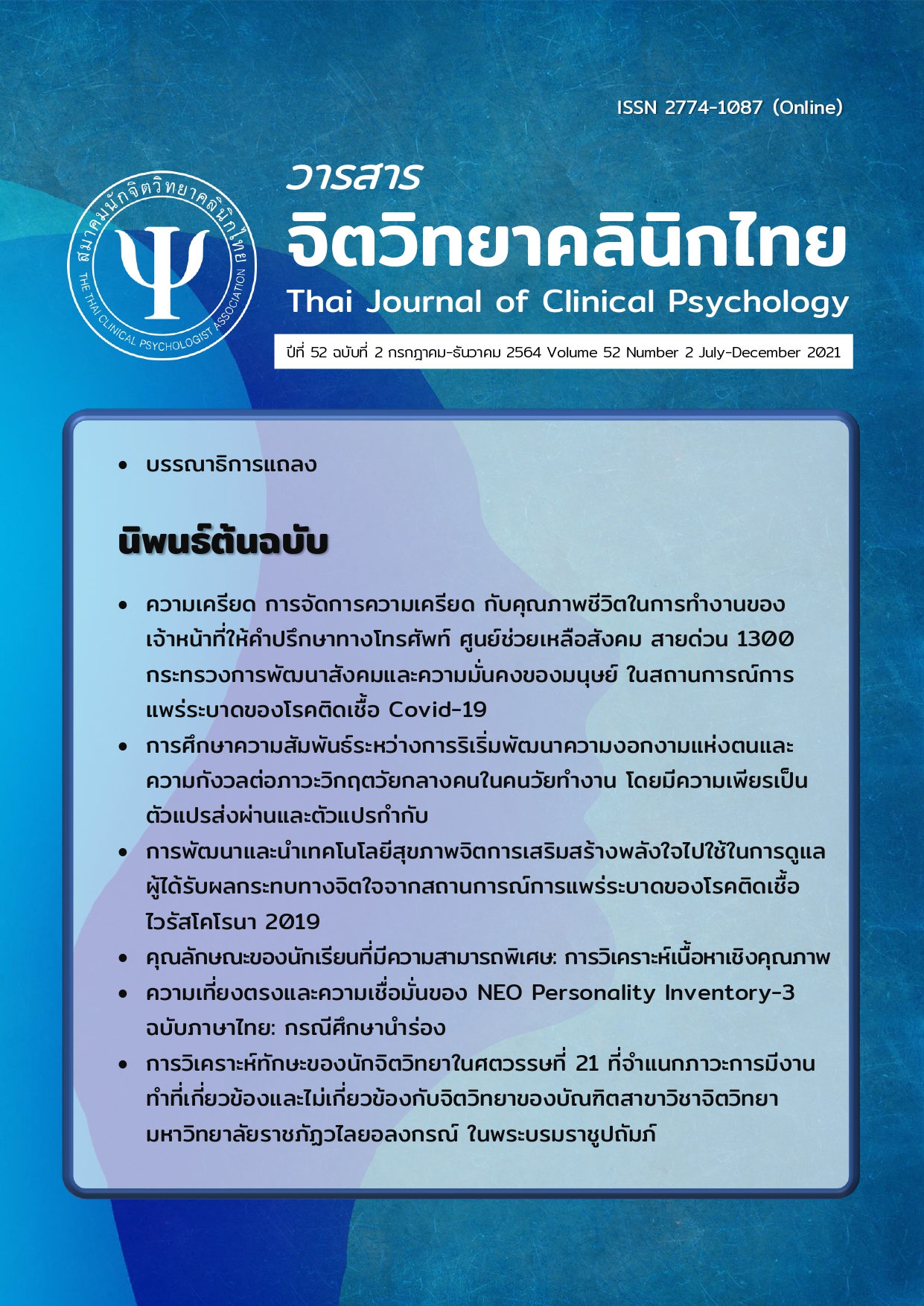คุณลักษณะของนักเรียนที่มีความสามารถพิเศษ: การวิเคราะห์เนื้อหาเชิงคุณภาพ
Main Article Content
บทคัดย่อ
วัตถุประสงค์ เพื่อค้นหาคุณลักษณะของนักเรียนที่มีความสามารถพิเศษในโครงการพัฒนาและส่งเสริมผู้มีความสามารถพิเศษทางวิทยาศาสตร์และเทคโนโลยี (พสวท.)
วัสดุและวิธีการ ผู้ให้ข้อมูลหลัก คือ ผู้ที่เกี่ยวข้องกับนักเรียนที่มีความสามารถพิเศษ จำนวน 9 คน เก็บข้อมูลด้วยการสัมภาษณ์เชิงลึก อาศัยเทคนิค snowball จนได้ข้อมูลที่มีความอิ่มตัวจึงยุติ เครื่องมือที่ใช้ในการเก็บข้อมูล คือ 1) แบบสอบถามข้อมูลของผู้เข้าร่วมวิจัย และ 2) แบบสัมภาษณ์กึ่งโครงสร้าง วิเคราะห์ข้อมูลของผู้เข้าร่วมวิจัยด้วยสถิติเชิงพรรณนา และวิเคราะห์ข้อมูลเชิงคุณภาพด้วยการวิเคราะห์เนื้อหา (content analysis) โดยนำข้อมูลจากการสัมภาษณ์มากำหนดคำอ้างอิง ให้ความหมาย กำหนดคำอธิบายรหัส ตั้งรหัส และจัดกลุ่ม ดำเนินการวิเคราะห์เนื้อหาโดยผู้วิจัยและโปรแกรมช่วยวิเคราะห์ข้อมูลเชิงคุณภาพ Atlas.ti (Version 8)
ผล คุณลักษณะของนักเรียนที่มีความสามารถพิเศษประกอบด้วย 9 คุณลักษณะ 3 องค์ประกอบ ได้แก่ 1) ด้านการรู้คิด คือ คิดแบบนักวิทย์ รู้จักตนเอง รักในการเรียนรู้ 2) ด้านความรู้สึก คือ เห็นอกเห็นใจ จิตสาธารณะ และ (3) ด้านพฤติกรรมการแสดงออก คือ อึด-แกร่ง ทักษะจัดการความเครียด ทักษะสื่อสาร และทักษะสังคม
สรุปและการนำไปใช้ ข้อค้นพบนี้สะท้อนถึงคุณลักษณะนักเรียนที่มีความพิเศษในบริบทของไทย สามารถนำไปใช้เป็นข้อเสนอแนะเชิงนโยบายแก่ผู้บริหาร ตลอดจนเป็นองค์ความรู้สำหรับผู้ปฏิบัติงานในการต่อยอดไปสู่การพัฒนาเครื่องมือประเมินคุณลักษณะฉบับมาตรฐานหรือพัฒนาแนวทางการส่งเสริมคุณลักษณะที่เหมาะสมให้กับนักเรียนกลุ่มนี้ต่อไป
Article Details
เรื่องที่ลงตีพิมพ์ในวารสารจิตวิทยาคลินิกแล้วถือเป็นลิขสิทธิ์การเผยแพร่โดยวารสารจิตวิทยาคลินิกแต่เพียงผู้เดียว การตีพิมพ์หรือเผยแพร่ซ้ำในที่อื่นต้องได้รับอนุญาตจากกองบรรณาธิการวารสารฯ
เอกสารอ้างอิง
Al-Dhamit, Y., & Kreishan, L. (2016). Gifted students’ intrinsic and extrinsic motivations and parental influence on their motivation: from the selfdetermination theory perspective. Journal of Research in Special Educational Needs, 16(1), 13-23.
Dai, D. Y. (2020). Assessing and accessing high human potential: A brief history of giftedness and what it means to school psychologists. Psychology in the school, 57, 1514-1527.
Dixon, F. A., Cross, T. L., & Adams, C. M. (2001). Psychological characteristics of academically gifted students in a residential setting: a cluster analysis. Psychology in the Schools, 38(5), 433-445.
Erbas, A. K., & Bas, S. (2015). The contribution of personality traits, motivation, academic risk-taking and metacognition to the creative ability in mathematics. Creativity Research Journal, 27(4), 299-307.
Gur, C. (2011). Do gifted children have similar characteristics?: Observation of three gifted children. Procedia Social and Behavioral Sciences, 12, 426-435.
Hoque, E. (2016). Three Domains of Learning: Cognitive, Affective and Psychomotor. The Journal of EFL Education and Research, 2(2), 45-52.
Kaewkangwan, S. (2013). Psychology of children and adults with special needs. (6thedition). Bangkok: Moh-Chao-Ban Publishing House. (in Thai).
Kasemnet, L., Wongrattana, C., Jinnge, P., Khotchim, P. & Thongpukdee, T. (2014). The development of learning innovation for the parents and teachers of gifted child. Journal of Behavioral Science, 20(2), 155-170. (in Thai).
Meier, E., Vog, K., & Preckel, F. (2014). Motivational characteristics of students in gifted classes: The pivotal role of need for cognition. Learning and Individual Differences, 33, 39-46.
Office of the Education Council Ministry of Education. (2019). Research and development of the model mechanism for enhancing student discipline in educational institution fundamental education level, in area volunteering, selfless, empathy. Bangkok: Prikwangraphic. (in Thai).
Potisita, C. (2019). The art and science of qualitative research: handbook for social science researcher and student. (8thedition). Bangkok: Amarin Printing & Publishing Public Company Limited. (in Thai).
The Development and Promotion for Science and Technology (DPST). (2017). Project history DPST. Retrieved from http://dpst.ipst.ac.th/index.php/features (in Thai).
The Institute for the Promotion of Teaching Science and Technology (IPST). (1982). Seeking, cultivating, and promoting scientific intuition: A study of scientific talented traits. Bangkok: IPST Press. (in Thai).
The Institute for the Promotion of Teaching Science and Technology (IPST). (1986). Thedevelopment of scientifically talented tests: measure of scientific interested trait. Bangkok: IPST Press. (in Thai).
The Institute for the Promotion of Teaching Science and Technology (IPST). (1987a). The development of scientifically talented tests: scientific attitude test. Bangkok: IPST Press. (in Thai).
The Institute for the Promotion of Teaching Science and Technology (IPST). (1987b). The development of scientifically talented tests: scientists personality inventory. Bangkok: IPST Press. (in Thai).
Wellisch, M., & Brown, J. (2013). Many faces of a gifted personality: characteristics along a complex gifted spectrum. Talent Development & Excellence, 5(2), 43-58.
Wiley, K. R. (2020). The social and emotional world of gifted students: Moving beyond the label. Psychology in the Schools, 1-14, doi: 10.1002/pits.22340.
Yusof, R., Ishak, N. M., & Zahidi, A. M. (2015). Leadership characteristic among gifted and talented students at Malaysia national gifted center. International Journal of Scientific Research, 4(8), 588-594.
Zeidner, M., & Shani-Zinovich, I. (2011). Do academically gifted and nongifted students differ on the Big-Five and adaptive status? Some recent data and conclusions. Personality and Individual Differences, 51, 566-570.
Zeidner, M., & Shani-Zinovich, I. (2013). Research on personality and affective dispositions of gifted children: the Israeli scene. Gifted and Talented International, 28, (1-2), 35-50.


